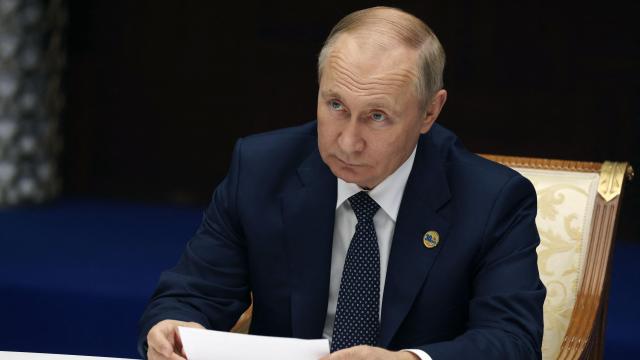The Russian government has set its sights on yet another U.S. tech company: Amazon.
This week a Russian court reportedly fined the e-commerce giant 4 million roubles (or $AU101,734 dollars) in two separate cases for allegedly refusing to remove content related to drug use and suicide, according to Reuters and Russian state media. The fines, a first for Amazon in Russia, represents the latest in an escalation of penalties dished out by the warring country in a trend rights groups warn may be degrading internet freedoms worldwide.
The Moscow-based court also reportedly fined Amazon-owned Twitch 8 million roubles (or $AU203,469) this week for allegedly refusing to remove banned content. Though complete details around that fine remain unclear, part of it reportedly comes in response to Twitch broadcasting multiple banned interviews with Oleksiy Arestovych, an adviser to Ukrainian president Volodymyr Zelensky. (Twitch received a separate fine for hosting interviews of the adviser back in August).
Russian authorities claim those interviews contained information “discrediting the Russian Armed forces” though it’s worth noting recently passed, draconian national security moves make even the slightest criticism of the war potentially punishable by jail time. Journalists in the region are even prohibited from calling the war a “war,” or an “invasion.” The Russian lawyer interviewing Arestovych was reportedly labelled a “foreign agent” by the Russian government. Twitch has apparently removed the video.
Amazon and Twitch did not immediately respond to Gizmodo’s requests for comments.
Though Russia’s aggressive internet restrictions precede its war with Ukraine, the recent military occupation nonetheless pushed its regulators to accelerate fines and infractions, particularly against U.S.-based tech platforms. Earlier this year, Russian regulators fined Airbnb, Pinterest, and Twitch an unknown amount for allegedly failing to store data they had on Russian citizens within its borders. On the content side, Russia fined TikTok 2 million roubles for refusing to remove supposed LGBTQ content.
Those cases were nothing, however, compared to the government’s $US364 ($505) million Google fine in July. In that scenario, Russian authorities slammed the hammer down on Google-owned YouTube for allegedly promoting “extremism and terrorism,” as well anti-Russian propaganda centered on the country’s ongoing war with Ukraine. With Meta, Russian authorities went a step further by banning the service entirely and officially adding the company to its list of “terrorists and extremists” alongside the Taliban and the Islamic State.
Internet freedoms face challenges worldwide
In a new report, nonprofit human rights organisation Freedom House claims Russia’s wartime digital crackdowns are partly to blame for a global decline in internet freedoms, which it estimates have worsened for a 12th straight year. The annual report, titled, Freedom on The Net, analyses and scores individual country’s internet freedom on a scale of 0 to 100 by analysing a number of factors, including potential rights violations, state imposed limits on users’ internet access, and limits or banning of content. Russia, unsurprisingly, saw the starkest decline in internet freedoms of any of the 70 countries measured and wound up with a “not free” score of 23/100.
“The Russian government’s brazen invasion of Ukraine was the biggest driver of a decline in global internet freedom,” Freedom House Senior Research Analysts Kian Vesteinsson said in an interview with The Hill. “It’s had a really far reaching impact.”
The report claims the country blocked some 5,000 websites and moved to restrict access to social media platforms like Instagram, Facebook, and Twitter. In addition to the blocks, Freedom House cited a number of newly passed pieces of legislation that expanded the powers of state bodies tasked with regulation of the internet. Freedom House claims those moves are directly tied to Russia’s war effort.
“The regime’s increasing restrictions, both before and after the invasion was launched, significantly raised the risks associated with online activism and hastened the closure or exile of the country’s remaining independent media outlets,” the report reads.
Separately, the reports claim Russia has “hastened” its efforts to create a type of alternative internet called RuNet officials hope can one day be separated from global internet infrastructure.
Overall Russia’s internet freedoms in 2022 marked an all time low for the 12 years Freedom House has conducted its report. Remarkably, Russia still scored higher than China (10/100) which had the worst total internet freedom score for the eighth consecutive year. In the U.S., by contrast, internet freedoms “improved marginally” for the first time in six years.
It’s worth noting that while Freedom House is well regarded among a large number of rights groups, some academic and commentators have criticised the organisation for allegedly biased and opaque data collection methods and overly simplified results. Others, more blatantly accuse Freedom House of reportledy having a, “neoliberal bias.” Biased or not, the increasingly long grocery list of fines being dished out and prison sentences administered in Russia since the start of the invasion clearly signals a move in one direction, and that move’s clearly not towards a more open and accessible internet.
